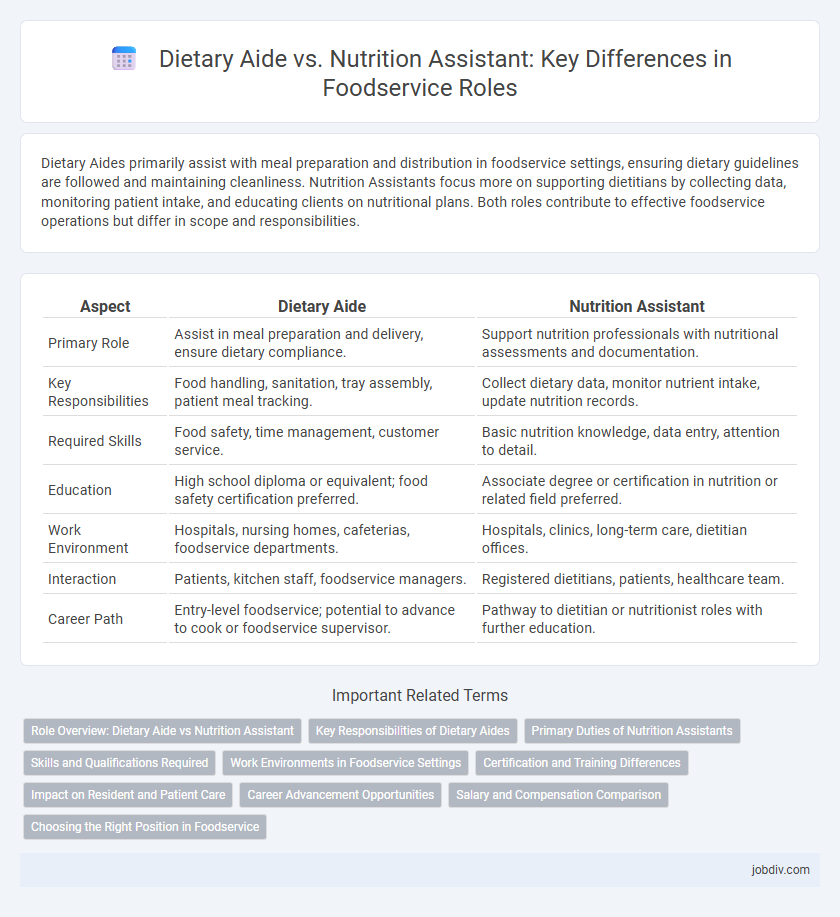Dietary Aides primarily assist with meal preparation and distribution in foodservice settings, ensuring dietary guidelines are followed and maintaining cleanliness. Nutrition Assistants focus more on supporting dietitians by collecting data, monitoring patient intake, and educating clients on nutritional plans. Both roles contribute to effective foodservice operations but differ in scope and responsibilities.
Table of Comparison
| Aspect | Dietary Aide | Nutrition Assistant |
|---|---|---|
| Primary Role | Assist in meal preparation and delivery, ensure dietary compliance. | Support nutrition professionals with nutritional assessments and documentation. |
| Key Responsibilities | Food handling, sanitation, tray assembly, patient meal tracking. | Collect dietary data, monitor nutrient intake, update nutrition records. |
| Required Skills | Food safety, time management, customer service. | Basic nutrition knowledge, data entry, attention to detail. |
| Education | High school diploma or equivalent; food safety certification preferred. | Associate degree or certification in nutrition or related field preferred. |
| Work Environment | Hospitals, nursing homes, cafeterias, foodservice departments. | Hospitals, clinics, long-term care, dietitian offices. |
| Interaction | Patients, kitchen staff, foodservice managers. | Registered dietitians, patients, healthcare team. |
| Career Path | Entry-level foodservice; potential to advance to cook or foodservice supervisor. | Pathway to dietitian or nutritionist roles with further education. |
Role Overview: Dietary Aide vs Nutrition Assistant
Dietary Aides are responsible for preparing and delivering meals in foodservice settings while ensuring compliance with dietary restrictions and hygiene standards. Nutrition Assistants focus on supporting dietitians by assessing patient nutritional needs, monitoring food intake, and assisting in the development of dietary plans. Both roles contribute to patient care, but Dietary Aides emphasize meal service, whereas Nutrition Assistants prioritize nutritional assessment and planning.
Key Responsibilities of Dietary Aides
Dietary Aides primarily focus on preparing and serving meals that meet specific dietary requirements, ensuring food safety and sanitation standards are consistently upheld. They assist in maintaining accurate dietary records and collaborate with nutritionists to accommodate patient or client nutritional needs. Their responsibilities also include cleaning kitchen equipment and dining areas to support a hygienic foodservice environment.
Primary Duties of Nutrition Assistants
Nutrition Assistants primarily support registered dietitians and nutritionists by preparing and distributing meals according to prescribed dietary plans while ensuring food safety and sanitation standards are met. They assist in monitoring patient food intake and maintaining accurate dietary records to optimize nutritional care. Their role involves coordinating with kitchen staff and healthcare providers to facilitate proper nutrition for patients with specific dietary needs.
Skills and Qualifications Required
Dietary Aides require basic knowledge of food safety, portion control, and the ability to follow dietary guidelines, often needing a high school diploma and on-the-job training. Nutrition Assistants possess advanced skills in nutritional assessment and meal planning, typically holding certifications such as a Certified Dietary Manager (CDM) or relevant associate degrees. Both roles demand strong communication skills and attention to detail to support individualized dietary needs within healthcare or foodservice settings.
Work Environments in Foodservice Settings
Dietary Aides typically work in hospitals, nursing homes, and long-term care facilities, ensuring patient meals meet specific dietary requirements, while Nutrition Assistants often operate in clinical settings, schools, or public health organizations, supporting nutrition programs and educating clients. Both roles involve collaboration with dietitians and foodservice staff but differ in direct patient or client interaction and responsibilities related to meal preparation and dietary compliance. Work environments for Dietary Aides emphasize adherence to institutional dietary guidelines, whereas Nutrition Assistants focus on community health initiatives and nutritional assessments.
Certification and Training Differences
Dietary Aides often require basic on-the-job training focused on food handling, sanitation, and patient meal delivery, with certification requirements varying by state or employer. Nutrition Assistants generally need formal training in nutrition principles, sometimes including completion of accredited programs and certification such as the Certified Dietary Manager (CDM) credential. The differentiation in certification and training emphasizes the Nutrition Assistant's role in supporting dietary planning and nutritional assessments beyond the basic food service duties of a Dietary Aide.
Impact on Resident and Patient Care
Dietary Aides ensure accurate meal preparation and timely delivery, supporting patients' nutritional needs and enhancing their overall care experience. Nutrition Assistants contribute by monitoring dietary intake and assisting with personalized nutrition plans, promoting better health outcomes for residents. Both roles collaboratively improve patient satisfaction and recovery through tailored dietary management in healthcare settings.
Career Advancement Opportunities
Dietary Aides typically perform basic food preparation and delivery tasks with limited scope for advancement, often requiring additional certifications to move up. Nutrition Assistants engage more directly in patient nutrition planning and monitoring, offering clearer pathways to become Registered Dietitians or Nutritionists. Career advancement opportunities in Nutrition Assistant roles are generally broader due to the specialized skills and knowledge acquired.
Salary and Compensation Comparison
Dietary Aides typically earn an average hourly wage of $12 to $15, while Nutrition Assistants command slightly higher pay, ranging from $14 to $18 per hour due to their specialized knowledge in nutritional planning. Benefits packages for Nutrition Assistants often include healthcare, retirement plans, and paid training, reflecting the advanced responsibilities compared to Dietary Aides, who may have more limited or basic benefits. Salary variation depends on healthcare facility type, geographic location, and experience level within the foodservice sector.
Choosing the Right Position in Foodservice
Choosing the right position in foodservice depends on specific responsibilities and skill sets: Dietary Aides primarily assist with meal delivery and ensuring dietary compliance for patients, while Nutrition Assistants focus on supporting dietitians by preparing nutritional information and assisting with client assessments. Understanding the scope of each role helps foodservice managers optimize team efficiency and meet regulatory standards. Job candidates should evaluate their interest in direct patient care versus nutritional planning to select the most suitable position.
Dietary Aide vs Nutrition Assistant Infographic

 jobdiv.com
jobdiv.com